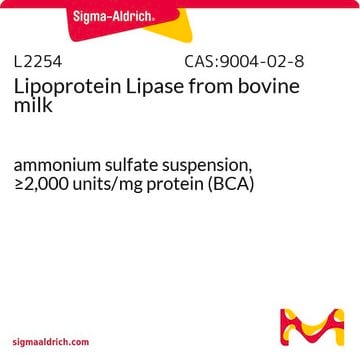30058
Lipase Substrate
≥95% (HPLC)
Synonym(s):
1,2-Di-O-lauryl-rac-glycero-3-(glutaric acid 6-methylresorufin ester)
About This Item
Recommended Products
Assay
≥95% (HPLC)
form
powder
solubility
ethanol: soluble (10mg/mL)
fluorescence
λex 529 nm; λem 600 nm in 0.1 M Tris pH 8.4
storage temp.
2-8°C
SMILES string
CCCCCCCCCCCCOCC(COC(=O)CCCC(=O)Oc1ccc2N=C3C=CC(=O)C(C)=C3Oc2c1)OCCCCCCCCCCCC
InChI
1S/C45H69NO8/c1-4-6-8-10-12-14-16-18-20-22-31-50-34-38(51-32-23-21-19-17-15-13-11-9-7-5-2)35-52-43(48)25-24-26-44(49)53-37-27-28-39-42(33-37)54-45-36(3)41(47)30-29-40(45)46-39/h27-30,33,38H,4-26,31-32,34-35H2,1-3H3
InChI key
FYOMYGYHAZESGQ-UHFFFAOYSA-N
General description
Application
Storage Class Code
11 - Combustible Solids
WGK
WGK 3
Flash Point(F)
Not applicable
Flash Point(C)
Not applicable
Personal Protective Equipment
Certificates of Analysis (COA)
Search for Certificates of Analysis (COA) by entering the products Lot/Batch Number. Lot and Batch Numbers can be found on a product’s label following the words ‘Lot’ or ‘Batch’.
Already Own This Product?
Find documentation for the products that you have recently purchased in the Document Library.
Our team of scientists has experience in all areas of research including Life Science, Material Science, Chemical Synthesis, Chromatography, Analytical and many others.
Contact Technical Service








